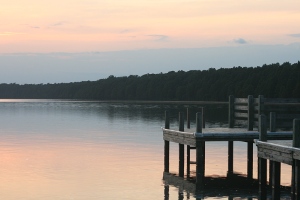 Researching rural development in coastal communities presents a lot of land mines. I’ll let you imagine and populate that list yourself. Each one of those things deserves its own blog entry at least, or perhaps even a book. But one topic above all others permeates both my personal life and my dissertation research – climate change.
Researching rural development in coastal communities presents a lot of land mines. I’ll let you imagine and populate that list yourself. Each one of those things deserves its own blog entry at least, or perhaps even a book. But one topic above all others permeates both my personal life and my dissertation research – climate change.
Yes, there are the newly minted signs in my neighborhood declaring the area under the “high water” mark. There’s also the friend who advised me against purchasing a house not because of financial concerns but because said house may be under water soon. There’s also the shift in local fishery species on which the community depends. But let’s set aside the physical realities for a moment…
Do I encourage discussion of global warming when interviewing people about the future of their town? Because it will have one of two responses: they’ll completely dismiss me from then on and refuse to answer further questions about the environment or they’ll admit that we’ve finally addressed the elephant in the room and delve into deep philosophy that provides the meat of the analysis in my research.
It’s a personal call, to a certain degree a complete guess, to anticipate which of these responses I’ll receive. Yet another perk to living in your study community as a member of the local character is that good data and stories and clues for that decision arise in the most random of places. For instance, a few days ago I was working in the local coffee shop absorbing the smell of freshly baking cinnamon buns and fostering the coffee drip into my system when a couple of fishermen came in and sat at a neighboring table to have their afternoon coffees, just a part of their daily routine.

The day’s weather was particularly disgusting so the warm coffee was quite welcome. So was a self-solicited discussion of global warming, complete with a coverage of philosophy of scientific inquiry and the place of global warming in the wider net of environmental issues. A few precious gems from the conversation:
on climate scientists:
– “if you ask a geologist that doesn’t depend on grant money, they’ll tell you” [what’s really going on]
– “what happens is that these things become religious in nature – people will ask you if you believe in global warming – what is that? Science isn’t about belief, it’s about experiments and data”
– “I do believe we’re living in the age of enfrightenment”
on other issues:
– “you can’t tell me you can blow a hole in the ozone layer from hairspray… VOC’s have been – that’s what perfume is, that’s what turpentine is – and then you’ve got all this talk about particulates, but then one volcano could just upset everything”
on resilience of earth and community:
– “this dog earth will shake off all its fleas sometime”
– “stick with the water, keep your cast net ready – if you live in a place where it all works, you’ll be fine… if you live around here with half a brain, you’ll be fine”
– “but it’s really about lifestyle, standard of living – if we keep breeding like termites, resources are limited”
– “we have this idea that life is extremely valuable, but nature says otherwise”
My take on this snippet of life and conversation – climate change is a concern within at least the fishing community and there’s even shreds of optimism that things could get better, even if that takes drastic changes such as a huge decline in fertility and population. They may be skeptical than many of information that’s out there, but they’re far from scientifically illiterate.
~Bluegrass Blue Crab
those geologists ruin everything.